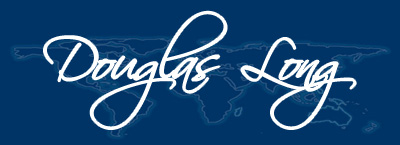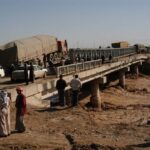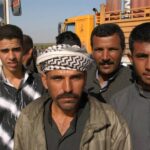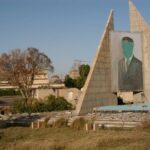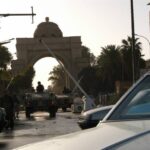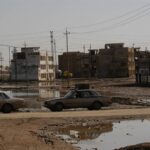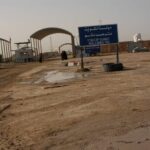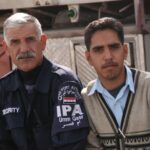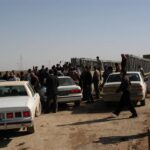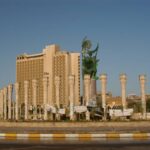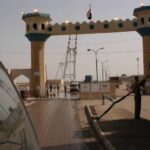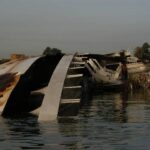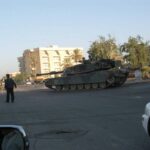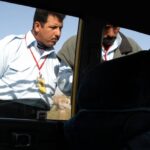Iraq
TRAVEL
NAVIGATION
My next destination was Iraq. Crossing from Iran into Iraq meant crossing one of the most sensitive borders in the world. My apprehensions proved unnecessary. It seems that the war between Iran and Iraq was a creation of Sadam Hussein, and not any hatred of the people of the two countries. At the border on the main route between Tehran and Baghdad, Iran has build a huge complex to support what they anticipate to be booming trade between the two countries.
Personal contacts are the key to traveling in conflict zones. My friend manages the UN relief cargo flowing into Iraq, and his man on the ground was Husain, a boisterous Kurd. He brought me to the border station has introduced me to the official running the entire facility, a rather young but professional man who seemed very interested to hear what this American had to say about Iran and relations between our countries. I was snapping pictures discretely when possible, but being the first American to show up here meant that all eyes were on me.
At the border itself, a one meter fence separates the two countries. Since Centcom, the US organization running Iraq, does not permit Iranian trucks in Iraq, there was a chaotic scene of cargo being transloaded over the fence onto Iraqi trucks. The passenger traffic was even more interesting. Much to my education, Iraq has some religious sites of great significance to Shiites, that have been unreachable for the past two decades. Now that they are within reach, thousands of mostly old women are crossing the border every day on a pilgrimage.
Iraq’s border facilities were not bombed, but they have no electricity, no water, and no supplies. Everything, power, water, even the food, is supplied by Iran for free. An American leads the Iraqi team at the border, but I never saw him. The Iraqis were surprised to see me, and took my passport for a half hour to inquire about my status. Centcom does not have any visa system in place, and there was also no system for who gets to enter and who does not.
Husain passed me onto an Iraqi that he knows “like a brother”. I would hear that a lot in the ensuing days. That person walked me 100 meters to a bus terminal sort of place where drivers were waiting. My host of 100 meters had my money changed into the new currency, and for US$40 I got a driver to Baghdad. The driver, Ahmed, was a Kurd, pleased to see me as a sign that things were normalizing if “tourists” were coming to Iraq.
Iraq, as I was to learn in the next few days, is a powder keg, where anything can happen at any time. I felt secure in my endeavours, but that’s only because I’ve been every conflict zone in the world and know how to move. My goal here was to see the logistics infrastructure, to observe the condition of roads, ports, etc, and see how cargo was moving. But my ability to talk to Iraqis were very limited and my Kurds spoke no English. They did, however, prove invaluable at keeping me safe.
Ahmed ran into his brother, Ali, on the drive from the border into Baghdad, that afternoon. Ali and their father would take over from Baghdad and take me in the following days south to Kuwait. My friend and Husain said it was too dangerous and advised me to go West to Jordan. My Kurdish escorts said that while things were sensitive, they could get me through alive. If I were dragged off, they would not get paid.
Within a few miles of entering Iraq, we encountered the first road stop, one of hundreds that dot the roads. Iraqi police, newly uniformed and apparently clueless about what they were looking for, checked our IDs while US soldiers stayed safely to the side inside armored personnel carriers (APCs) or bunkers. I soon realized that the US, to protect our soldiers, have relinquished the streets to Iraqis. The TV reports we see of US soldiers walking around are highly misleading. Rarely did I see any US soldier off his armored vehicle. For that matter, I never saw any westerner other that the US or British soldiers in my entire visit.
Baghdad was definitely a war zone. All major buildings were bombed out. Those still in use were surrounded by tons of concrete barricades. American tanks cruised through city traffic. But the city was also very much alive and moving. The hotels were all open. Electricity was flowing. I stayed at the New Lebanon Hotel, where they helpful English speaking staff were eager to provide me whatever services possible since I was the only one there spending money. The rooms were the same as any other country, but for some odd reason the satellite TV carried 20 channels of Italian programs.
My personal communications were done with an Irridium satellite phone. The handset cost $1200 and for $2 a minute I was in contact with the world regardless of where in the world I moved. At the hotel, the staff escorted me to the roof, because direct access to the sky was the major requirement of a sat phone. After my call, he asked if he could use the phone to call his brother in Germany. He was effusively thankful for the first opportunity in months to talk with his family.
After the one night in Baghdad, Ali and Dad took me on a wild ride of the city. The famous circle where Sadam’s statue was pulled down has now been replaced with a horribly ugly statue of something that I could not determine. We drove past scores of huge and dramatic bombed out buildings. US forces were everywhere.
Sadam’s face was hard to find, even painted over. As we moved south, it because apparent that all the murals of the old despot were not obliterated so much as replaced. At every opportune wall, Shiits have painted their leader, the Ayatollah Sistani. It is as if one strong man was replaced by another, although clearly Sistani has the support of the masses. There was also no evidence of any gratitude toward the US. Despite the fact that Sadam killed millions of Kurds, they did not seem inclined to post a single banner of thanks to the US forces. I had seen shows of gratitude to the US in Kosovo and Kuwait, but not here.
My job hear was to observe the business environment, and the State Department advice proved highly inaccurate. Their bulletins stated that the logistics infrastructure was devastated. No, not true. On the drive from Baghdad south to the Port of Um Qasr, we moved along freeways that had no obstacles other than the police stops that were pointless and unnecessary. One bridge proved to be a problem. It was bombed out, and replaced with a single lane metal bridge. Nobody controlled traffic, so a circus act ensued. A few cars would pass in one direction. Then the people on the other side would block traffic, and after a lot of yelling, a few cars would move in the other direction.
After an hour of this, two men arrived dressed vaguely like US Special Forces. They acted like they were in charge, and with their automatic weapons they certainly could do so. But they didn’t do anything. I talked to one of them, and he said he was an Iraqi American from Minneapolis, hired to manage “civilian affairs”. I don’t think he knew how to operate his weapon, and he didn’t seem to do anything to manage the traffic.
Once past that bridge, thanks to the persistence and bravado of my Kurdish escorts, it was clear sailing past hundred of dead tanks and artillery to Basra. The town is covered in garbage, but the people were friendly. My hotel was a hovel, so I slept fully clothed. In the morning we hired a boat to take us to the Al Mansur, Sadam’s luxury yacht bombed during the war. It has since capsized and lies rusting in the middle of the city’s waterfront.
On the third day we arrived at the Kuwaiti border. I didn’t have a visa because Kuwait requires an invitation and a long process of application. Since I didn’t know when I would arrive at the border, it was not possible to plan ahead. But since we saved their country in a rather dramatic way, I could not imagine them turning me away.
But they did. The border guards ignored my pleading, refusing me entry even though Iraq was clearly dangerous and I was at great risk. As we stood there arguing, two SUVs passed, carrying British men in flac jackets. They were paramilitaries, essentially soldiers of fortune hired by someone that they could not easily explain, to provide security in the port area. They took one look at me and beckoned me into their vehicles. What in Gods name was I doing walking around unprotected, they asked? The took me to their base, in the Port of Um Qasr.
Prior to this trip I had contacted SSA Marine, the Seattle based company that has the contract to run the Port. My requests to visit the port went unanswered. Now that I was there, they same people who didn’t even answer my emails were all there, amazed at the arrival of someone not surrounded by armed guards. The Port, as I soon discovered, was in fine condition. It has several container cranes, good rail connections, in short, it’s a world class port sitting mostly unused while the rest of the country sorts itself out. The SSA staff lives in prefab houses inside a large hangar. Iraqis guard the port, but a US contractor using Philipino guards protect the hangar where the American and Brits work. The compound is surrounded by containers, some of which show the scars of combat.
The Brits that picked me up gave me two options. Stow on board a ferry to Kuwait, or smuggle me across the border into Kuwait. Once in Kuwait I would not have a visa. I chose the latter instead of stowing away on a ship. The Brits then dressed me up as one of them, and we returned to the border where the Kuwaitis waived them across as they do many times every day.
Once across, we drove through a demilitarized zone several kilometers deep. In the middle of this was a massive UN compound, lying empty with nobody in site. Everything was white and the UN letters written across the roofs.
Once in Kuwait, the Brits took me into Kuwait City, where I caught a taxi to the US Embassy. It seems that for all Kuwait owes the US, we would get a little respect. Not according to the foreign service officers (FSOs) in our embassy. Now this is a sore point with me. In all my travels, 120 countries in all, I have not met a single US Embassy staff person that was professional and decent. It has been my experience everywhere around the world that our embassies are staffed by people more concerned with pursuing their official prerogatives and luxuries, with no thought to the needs of traveling Americans. The staff at our Embassy in Kuwait was no different.
The FSOs told me I had broken Kuwait law, and the consequences could be severe. He even went so far as to suggest I smuggle myself back across the border into Iraq, and drive across the entire country to Jordan! All they could do was write a bland letter to the Foreign Ministry stating I was a US citizen and please take care of my needs. No phone calls, nothing but a lame letter. The one thing they did do was to arrange for me to stay at the Radisson SAS, since it’s impossible to check into a hotel without a visa. They were entirely uninterested in any news I had of the situation in Iraq.
Once in the hotel, I realized that this was the time to take action to prevent me from ending in a Kuwaiti jail. My best hope was to have friends in high places fax the foreign ministry to let them know that I was not just a nobody, and that although my presence there was a violation of their law, I meant them no trouble. My only goal was to travel on to Bahrain. My email went to about 20 people, and thanks again to Peter Tirschwell of the Journal of Commerce for his strong support.
As it turned out, my fears were not necessary. An Arab pilot I met on a flight in Somalia responded with an email to the CEO of the largest freight forwarding and travel agency outfit in the country. The CEO called me within an hour, and I was soon sitting at one of his many restaurants while he smoked shisha. He expressed his gratitude at all that the Americans had done for Kuwait.
The next morning he drove me to the airport. He walked me to Immigration. He spoke a few words of Arabic to the airport official, who turned to me and gestured for me to follow. He led me past the passport stamping crowd, to the gates where he bade me bon voyage. My passport was never stamped by Kuwait, and I wasn’t going to press my luck in asking for a stamp.
What is most remarkable is that US Embassy in Kuwait seemed absolutely helpless in this matter. We are the most powerful country in the world, yet our Embassies often serve the needs of our corporations while the citizens are left to fend for themselves.
Zoom thumbnails by clicking on them
